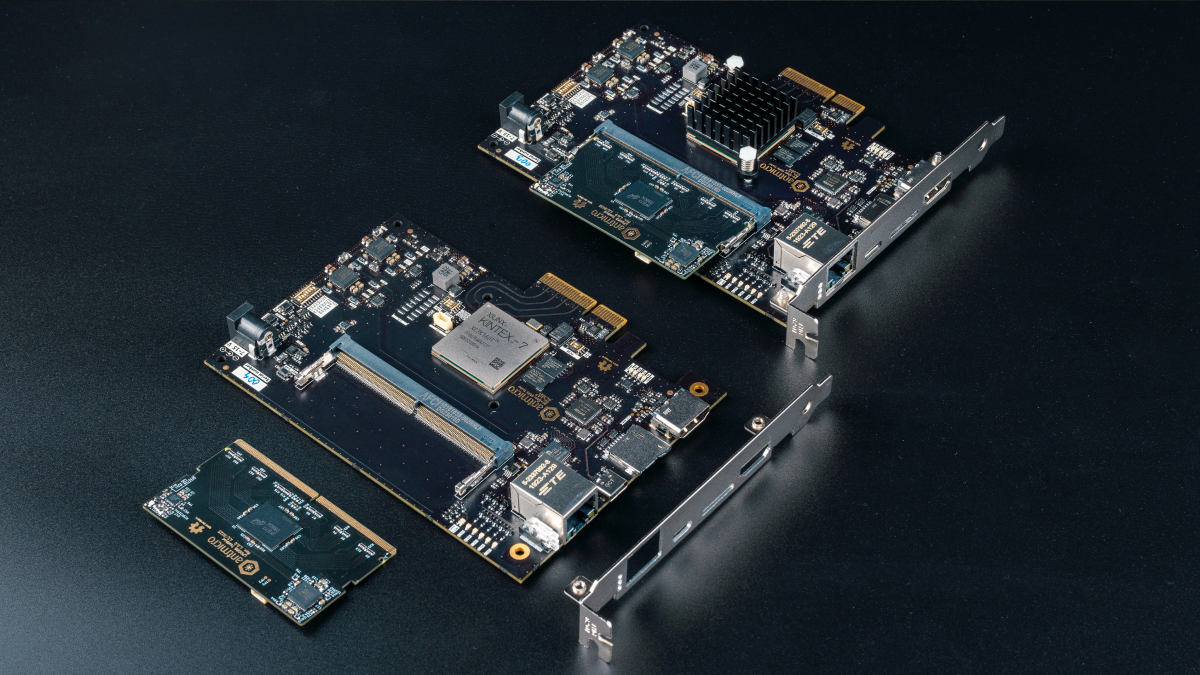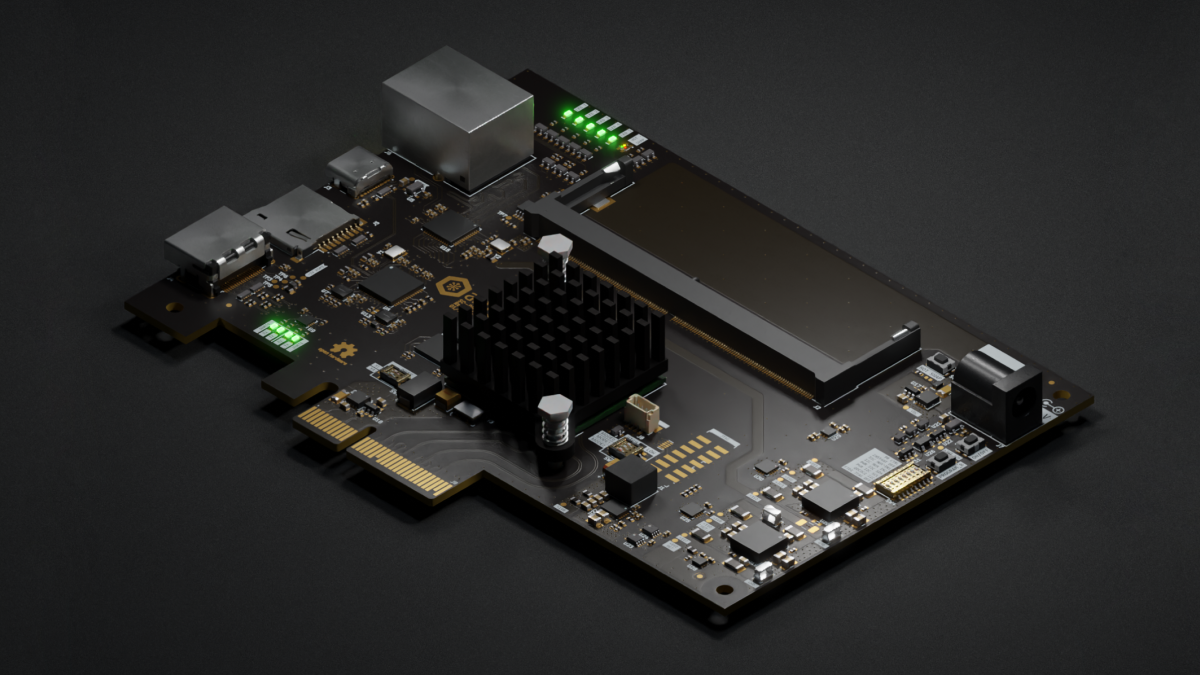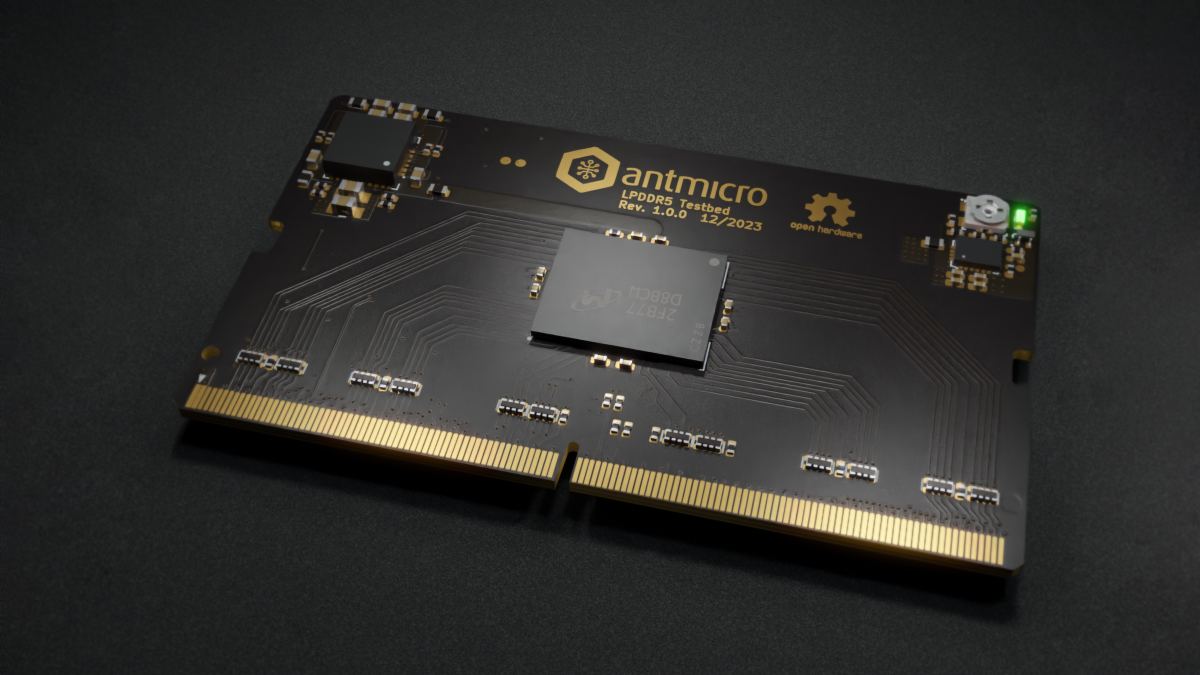Versatile SO-DIMM (LP)DDR5 Rowhammer testing platform
Published:
Topics: Open hardware, Open security / safety, Open source tools
Ten years after the first disclosure of the initial Rowhammer security exploit, new DRAM vulnerabilities continue to be discovered, and developing new and efficient mitigation techniques requires a deep understanding of the problem considering the complexity of modern DRAM. To safeguard its Data Center and edge device use cases, Google has been using Antmicro’s advanced R&D capabilities to develop an open source FPGA-based memory testing suite and family of open hardware platforms, expanding beyond the capabilities of pure-software vulnerability testing and mitigation approaches. The targeted DDR variants have so far included LPDDR4, DDR4 and DDR5 RDIMM.
In this blog note, we will describe a new addition to the family, our latest DDR5 Tester Board that is compatible with both standard DDR5 SO-DIMMs and our new LPDDR5 testbed, also developed in this iteration of the project with Google. In principle, the SO-DIMM DDR5 Tester was developed to enable LPDDR5 Rowhammer testing, but the SO-DIMM capability is a nice addition that lets us use and test the Tester board without the need for a custom testbed.

Rowhammer continues to be a serious threat
Although thanks to the collaborative work between universities such as ETHZ, companies like Google and Antmicro as well as memory vendors, there are now both software and hardware testing platforms targeting DDR4 and DDR5 and an array of manufacturer-led mitigation techniques, Rowhammer continues to be a threat in all recent DRAM technologies, including DDR5.
Additional research has shown that Rowhammer mitigations cannot rely solely on standard solutions like ECC, but that they need to be implemented in both hardware and software, also at the memory controller level. In fact, as part of Antmicro’s participation in the EU TRISTAN project, we are currently working on an open source and fully customizable, ASIC-ready LPDDR4 controller module, which can be equipped with custom Rowhammer and other security vulnerability mitigations. More information about this work will be included in a future blog note.
Versatile memory testing platform for the DDR5 era
The Rowhammer testing suite has already supported RDIMM DDR5 used in data centers for some time, thanks to the previously developed DDR5 board.
However, to enable testing of LPDDR5, a new platform had to be developed, and we used that opportunity to incorporate several new features that were not available on our previous baseboards into the design.
While the previous LPDDR-focused platform in the series, the LPDDR Tester featured a custom SO-DIMM pinout that made it compatible only with special testing modules designed specifically with that board in mind, the new LPDDR5 version follows the regular SO-DIMM pinout and thus is also possible to use with regular DDR5 SO-DIMM memory sticks used in desktop and some laptop platforms.
The SO-DIMM DDR5 Tester Board has been designed to function as both a standalone platform (running e.g. Linux or Zephyr, without the need for connecting it to a separate host machine) as well as an expansion board thanks to the PCIe interface described below. Besides PCIe and the (now standard) DDR5 SO-DIMM slot, as usual the board comes with both HDMI and USB-C connectors, 16Mb of flash memory, a 1Gb Ethernet RJ45 port and a microSD slot.

As mentioned before, this is also the first DDR tester board from Antmicro that features a PCIe interface, meaning that it is possible for the SO-DIMM DDR5 Tester Board to function as a PCIe expansion card, enabling use in clusters or a real datacenter context. The addition of PCIe on top of the slower Ethernet link that was previously the main way to connect the board to an external host opens up the door to new testing possibilities, such as injecting faults over the PCIe link or dumping the contents of memory on demand. The platform also enables investigation of the PCIe link itself for potential vulnerabilities, which is an area of increasing interest for researchers, and a potential area where we might develop dedicated tester boards in the future.
The other board which we have released a newer LPDDR5 testbed that is compatible with the SO-DIMM DDR5 Tester Board, specifically targeted at Micron MT60B2G8HB-48B:A 16Gb DRAM modules, commonly used in large scale commercial applications such as data centers. The code for the open source controller has been previously developed and published on GitHub as part of our Rowhammer Tester framework.

Future Plans
One of the potential developments we are looking at for the future is adapting the board to accommodate emerging standards such as CAMM2, approved by JEDEC in December 2023. Another potential idea is developing a new testbed integrating an interposer to enable easier swapping of memory chips and testing memory chips with an oscilloscope within a larger testing environment.
Both the SO-DIMM DDR5 Tester Board and the LPDDR5 testboard are available on our Open Hardware Portal which showcases our open hardware designs and provides a deeper dive into the board stackup, schematics, block diagram and a full list of components used in the design.
Custom hardware testing platforms with Antmicro
Antmicro is at the forefront of creating and expanding new open source and automated hardware and software tester solutions for our commercial customers, helping ensure the security and reliability of high-throughput interfaces like DDR or PCIe. With mitigations against Rowhammer being slow to market, comprehensive and systematic testing remains the only viable method of ascertaining whether a specific memory chip is vulnerable or not to attack due to manufacturing variances.
If you wish to discuss the possibility of creating specialist hardware and software testing platforms for your specific needs, or if you need open source tooling for comprehensive testing of hardware for new and existing vulnerabilities, get in touch with us at contact@antmicro.com.
